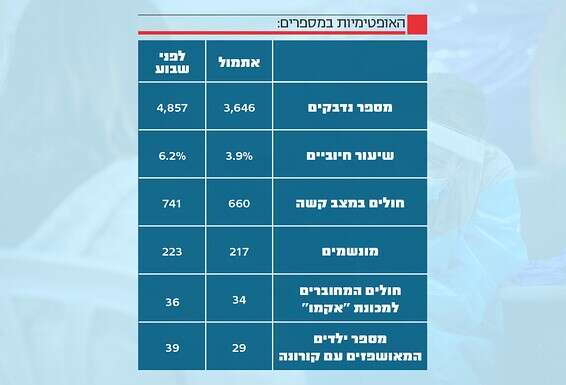Fear of mass outbreak following Purim events apparently faded - and Israel on the way to the first holiday with almost no restrictions • Projector Ash: "According to the data today - no further restrictions are expected on Passover" • Dr. Elrai-Price: "Encouraged that the infection rate has dropped and can continue to open"
Dining at a restaurant in Tel Aviv // Photo: Yehoshua Yosef
Just two weeks ago, senior Ministry of Health officials feared that Purim parties would lead to an increase in morbidity and even warned that they might harm the third phase of the relief.
But now, about a week and a half after Purim, the Ministry of Health is breathing a sigh of relief, noting that we were able to contain both the opening of the economy and the Purim events without an increase in infection.
The indices are encouraging: the rate of positive tests dropped within a week from 6.2% to 3.9%, although the number of tests remained unchanged.
The daily verified number dropped from about 4,800 a week ago to 3,646 yesterday.
Also the number of serious patients yesterday was 660 compared to 742 a week ago.
In addition, the number of children hospitalized with Corona was 29 yesterday, and 39 weeks ago.
"The data is optimistic, but I would wait two more days to say with confidence that we passed Purim without an increase in morbidity. Although it seems that the Friday and Saturday events of Purim passed peacefully, it is borderline," said Corona Projector Prof. Nachman Ash.
"We see that the first and second relief phases did not make a big difference in morbidity. I am mainly encouraged by the rate of positive tests in constant decline. The effect of the opening in the third phase will be seen in two weeks, just before the election."
Prof. Ash emphasizes that "I do not think we will reach unreasonable numbers. However, at the moment we do not have a contingency plan for restrictions. We do not have an R (adhesion coefficient) value where we say, 'Map we will have to stop'. It is a complex combination of several metrics, "We can not give clear parameters. If we see an increase in morbidity from the education system, we will have to limit there, or if we seem to circle corners in the 'green character' or in trade - we will limit there. It takes a lot of personal responsibility for each person to succeed."
Prof. Ash added that "it is still legitimate to talk about restrictions on Passover, we will see the data next week, but according to today's data, no further restrictions are expected on Passover, except for the existing restrictions."
He said, "The education system is the main factor I feared in the opening. We have seen an increase in both age groups 9-0 and 19-10. But in the last two days it has stopped and here too we have to wait a few more days to see it contained. I feared the British variant would cause a lot of classroom infections. And we have not seen such big events yet. "
Dr. Sharon Elrai-Price, head of public health services, was also optimistic. She said, "When we see the picture of the coefficient of infection, which is around 1, we encourage it to decline and we can continue to open.
Morbidity in at-risk populations is declining.
From a situation of 170 new patients a day, we have reached a situation of 80-70 patients a day. "
On preparing for Passover, Elrai-Price said, "I do not think there is any need to talk about Passover restrictions at the moment. Passover is another month and we all know how long it is a month in terms of Koruna. Many things can change. If the morbidity continues like this - a stable state of verified, I wish "It will go down, a coefficient of infection of 1 or less and a falling number of patients is difficult and critical - there will be no need for restrictions on Passover. It is the responsibility of all of us to keep all the rules.
On the impact of Purim events on morbidity, she said: "Two weeks have not yet passed since Purim and we still cannot quite say that Purim is behind us."
Prof. Ran Blitzer, head of the expert cabinet advising Corona and head of Clalit's innovation department, added that "we are two weeks into the second pulse and after the Purim events, and the fact that this 'stress test' the system underwent did not cause a significant increase in morbidity is very encouraging."
He said, "Vaccines seem to be giving their signals in an increasing way as a higher proportion of the population reaches the protected stage."
Regarding the preparations for Passover, Prof. Blitzer said that "during this period it is not worth predicting. Part of the policy adopted here has not been adopted anywhere in the world - it is about opening places with a high risk of infection such as restaurants and halls, while erupting and thousands of cases a day. We will learn and the world will learn from us. This concept achieves the goal - which is to prevent infection. "
According to Prof. Blitzer, the data on critically ill patients demonstrate the effectiveness of the vaccine: "The relatively small group of unvaccinated adults is responsible for the large majority of the corona wards, but the elderly population still needs to maintain precautions even after vaccination. "50% of those aged 50 and over who have not been vaccinated, or have not yet achieved a 'green mark', 25% under the age of 50 who have not been vaccinated, and only 5% of adults who became ill despite being vaccinated."

